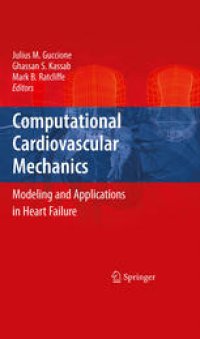
Ebook: Computational Cardiovascular Mechanics: Modeling and Applications in Heart Failure
- Genre: Mathematics // Computational Mathematics
- Tags: Biomedical Engineering, Cardiac Surgery, Theoretical and Applied Mechanics, Engineering Fluid Dynamics
- Year: 2010
- Publisher: Springer US
- Edition: 1
- Language: English
- pdf
Computational Cardiovascular Mechanics promotes the application of patient-specific cardiovascular mechanics models to clinical medicine, which aid medical diagnosis and enhance treatment for cardiovascular disease.
Organized in a two-part structure, this volume presents a comprehensive overview of computational modeling from both solid mechanics and fluid dynamics perspectives. Part I offers chapters devoted to various techniques involving finite element modeling of ventricular mechanics and computational fluid dynamics, with a focus in cardiovascular mechanics. Part II covers heart failure applications which utilize techniques in solid mechanics and fluid dynamics. In the former, both diagnostic (i.e., global and regional indices of myocardial contractility) as well as therapeutic approaches (surgical ventricular remodeling procedures, passive ventricular constraint devices, ventricular implantation of biomaterials and cardiac resynchronization therapy) are discussed. In the latter, the fluid mechanics of heart valves is simulated, as are surgical procedures and heart failure-related devices in the form of coronary artery bypass grafting and ventricular assist devices.
Computational Cardiovascular Mechanics is a vital resource for cardiovascular disease researchers who want to learn how to apply computational fluid and/or solid mechanics to the diagnosis and treatment of heart failure.
Computational Cardiovascular Mechanics provides a cohesive guide to creating mathematical models for the mechanics of diseased hearts to simulate the effects of current treatments for heart failure. Clearly organized in a two part structure, this volume discusses various areas of computational modeling of cardiovascular mechanics (finite element modeling of ventricular mechanics, fluid dynamics) in addition to a description an analysis of the current applications used (solid FE modeling, CFD).
Edited by experts in the field, researchers involved with biomedical and mechanical engineering will find Computational Cardiovascular Mechanics a valuable reference.